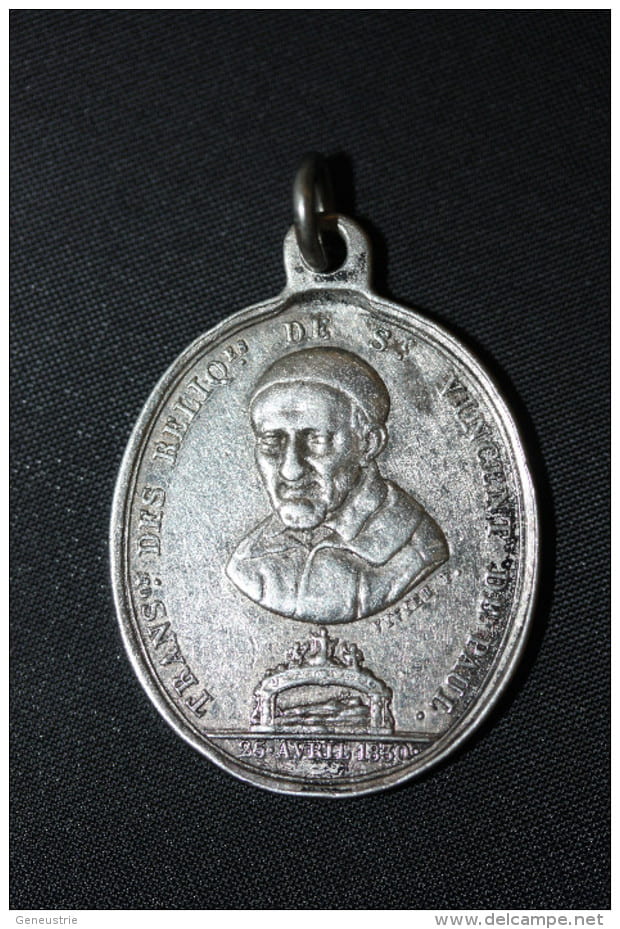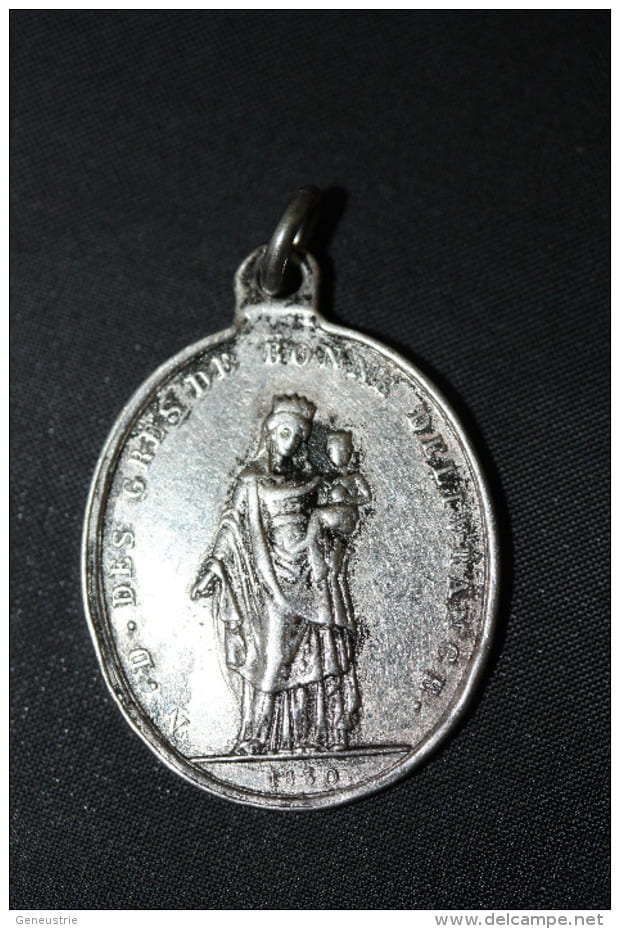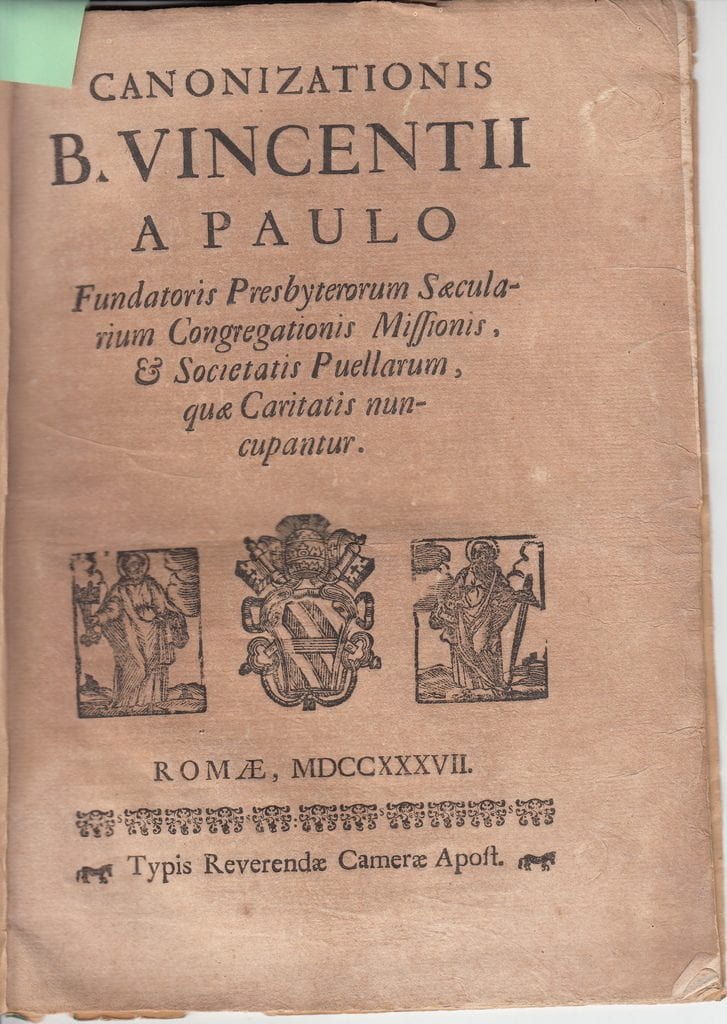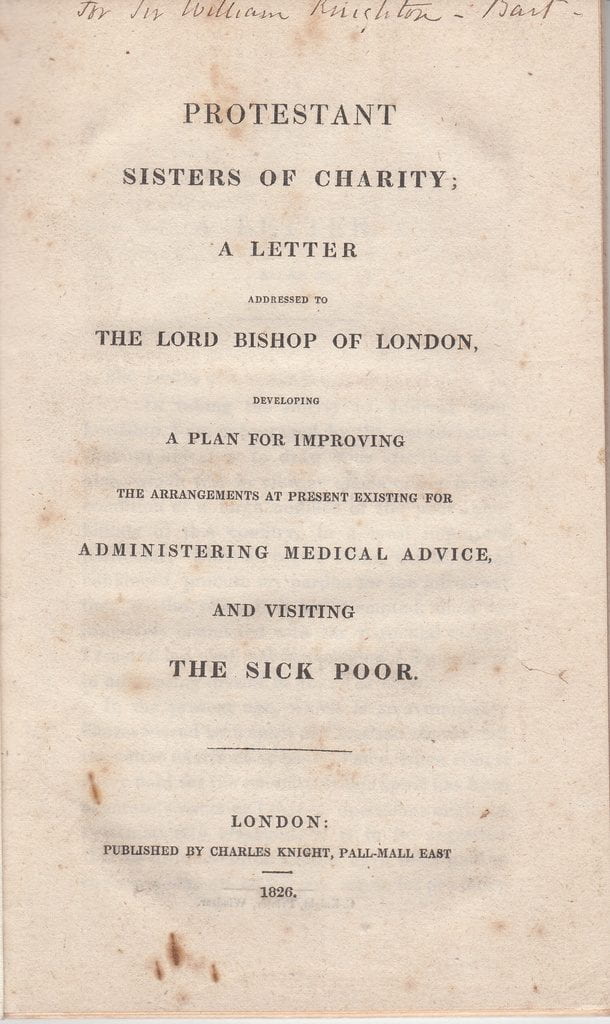The Vincentiana Collection at the Archives and Special Collections Department of DePaul University has recently purchased a previous unknown commemorative medal issued to celebrate the April 1830 translation of the relics of Vincent de Paul to their new resting place at Lazarist chapel on rue de Sevres. The image on the reverse of the medal is that of “Notre Dame des Gres de Bonne Deliverance.” This famous black madonna had resided in the Dominican church of Sainte Etienne des Gres on the rue Saint Jacques before the revolution. The statue survived the revolution and was given to the Sisters of Saint Thomas Villeneuve who also had a convent on the rue de sevres.
Author: bcicirel
Vincent de Paul: A Saint Who Got His Worlds Together
Thomas McKenna explains how Vincent de Paul “integrat[ed] the life of faith with so-called secular existence” and “examines his way of blending a spiritual vision with the hard-nosed world of finance and business.” For McKenna, this blending is the key to Vincent’s saintliness. He knew that human welfare had to include “spiritual and material aspects.” He used his business acumen, which is described in detail, to support his many ministries. These were intended to align society with the kingdom of heaven. Vincent focused on improving the lives of the poor because Christ was to be found in them, and they were to be first in the kingdom. McKenna discusses the questions that Vincent’s life raises in us, especially in our perceptions of the poor and how business should work. He also looks at the way the lives of the saints can influence modern faith. He says it is important to tell the stories of saints’ lives so that people can imagine themselves participating in the saints’ worlds. They can draw their own lessons from such an exercise.
“Vincent de Paul: A Saint Who Got His Worlds Together” is an article by Fr. Thomas McKenna, C.M., published in 1997 in the Vincentian Heritage Journal and is available at: https://via.library.depaul.edu/vhj/vol18/iss1/1
Speak Up and Say “NO” to Islamophobia
By: Shourouk Abdalla
I am instantly scared of the backlash on Muslims worldwide after the explosions in Paris. I’m already seeing Muslim friends of mine asking their Facebook friends to not correlate these attacks with Muslims or Islam. It is not even confirmed yet that ‘ISIS’ committed these attacks, and they probably did but please dear friends know that you DO NOT have to defend yourself. You alone should be living proof to your friends that terrorism has nothing to do with your religion.
I’d like to believe that the world is past this silly “jihadist, extreme Muslims” rhetoric but it’s not. So it makes sense to automatically want to share that the religion of Islam has nothing to do with this. However do so in a more strategic way. Help them get passed what the media doesn’t want the general viewers to get passed. Help them question what the government doesn’t want the general public to know. Ask them to think critically before being feed into media/gov prescribed islamaphobia. Inform them that “ISIL” has been terrorizing Muslims in Syria and Iraq since the group miraculously formed. Ask them to do research on the “history” of ISIS. Or it’s relation to various western governments and what could a world power benefit from these groups. Ask them to consider the fact that these extreme terrorist groups could be an inevitable result of European colonization. Colonization that has lead to a deteriorated Middle East region. Colonization that has instigated and manipulated wars among neighboring countries and created self-hate among these people through western supremacy and neo-colonialism. Colonization that has made these people dependent on the West in order to survive. Ask them to try to understand where it’s coming from and why. We can’t act surprised when there are terrorists attacks among western nations when years ago these countries were the attackers first. It is what it is and that still is no excuse for any type of attack.
Now if your friends need proof from Muslim religious scholars that the Quran doesn’t teach this then tell them to search the internet! Simple as that. There are thousands of religious leaders & scholars who have publically denounced the actions of these terrorist groups and have provided proof as well as what Islam says on the topics of killings, murder etc.
On to another important note. #PrayforBeirut. #PrayforYemen. #PrayforSyria. #PrayforNumerousAfricanCountries… the list is endless.
Yes, pray for them all. If you only begin to mourn once it’s a trend on social media that all your friends jumped onto or because it’s all over the news then please be concerned for your own being. Very little were going to talk about Lebanon if it wasn’t for Paris. At least we’re getting somewhere however do note that selective mourning and sympathy is offensive and these attacks in Paris should be a reminder of the horrific events going on in the world and a wake up call for everyone, ESPECIALLY to ISIS.
To friends who say it is not fair that people only care about France when things like this happen everyday. Indeed it is sad that everyone gets a quick update about horrific attacks only when it’s in a first world country and all the other countries get kicked aside. However it is fair for French to care about France as it is for Arabs to care about the Arab world. What makes it not fair is the controlled media that gets to pick and choose what to share and what to hype up. I HIGHLY suggest that everyone finds their own trustworthy source of information for global ongoings and stray away from government/power controlled media & news outlets. I stopped watching television years ago for a reason. While it is unclear why there is a constant series of terror and unfortunatee events all I have to say is that we must stay awake and keep an eye out for the source of everything.
The perpetrators of these horrendous attacks must be held accountable, apprehended, and brought to justice. Those brutal murders will have to answer to the One who created them. So even if there is no justice in this world, I find my comfort knowing that. “ “
*To my friends in Paris please mark yourself safe on Facebook or message me, I’m deeply concerned about your safety…
*To friends who don’t know, over 50 were killed in the “Paris of the Middle East.” Beirut, Lebanon.
#NoToTerrorism
Activism and Faith
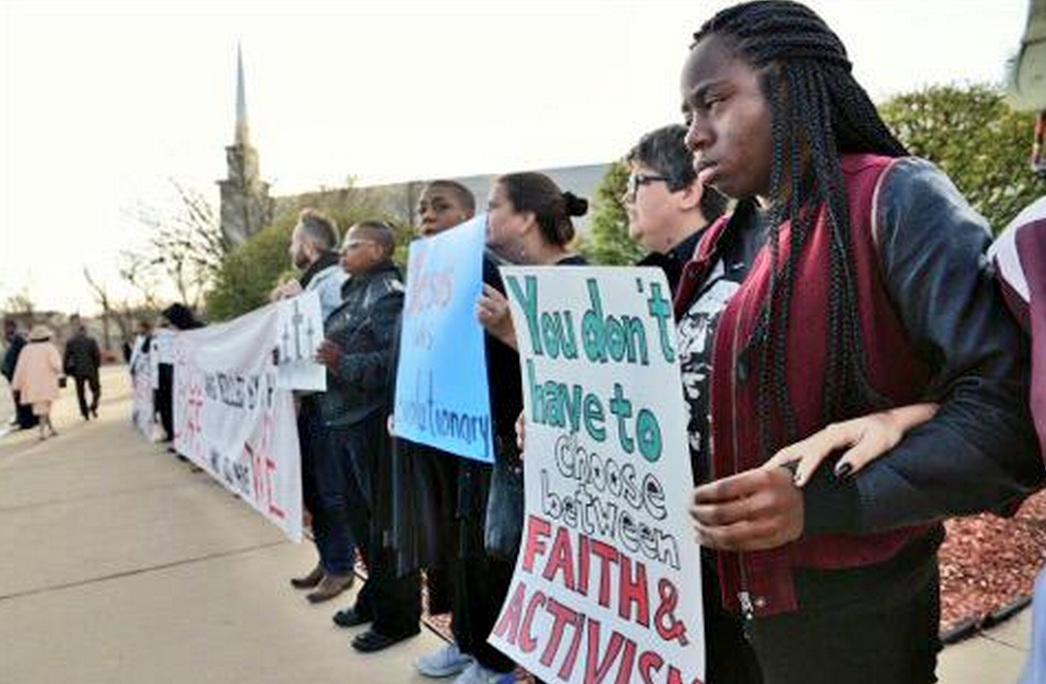
By: Shourouk Abdalla
Personally, before entering Depaul I have always been a person who questions ‘what must be done’. A person who fights injustices in everyday situations. This is an Islamic principle that I have grown to know very well, the Prophet PBUH said if you see something wrong, fix it with your hand, and if you cant fix it with your hand, speak of it with your tongue, and if you can’t do that, dislike it inside your heart and that is the weakest of faith. So as a Muslim we must oppose evil in an active and principled nuanced way, we must actively help, assist, and figure out ‘what must be done’. And this is the question St. Vincent spent his life answering. St. Vincent’s faith gave him a vision of how the world should look, in much of the same way so does Islam, therefore acting upon faith is a common ground and can invite anyone of all faiths and backgrounds to the Vincentian family and its values.
This reminds me of a Quick story: when the Prophet PBUH saw a man in a street and asked the man he was with, what do you think of this man, the man he was with responded by saying he is the noblestest of men and any woman would take his hand in marriage in a heartbeat. He later asked another man, ‘what do you think of this man’ and the man said this man?! He is the poorest of all muslims, and no women would ever accept his hand in marriage, no woman would ever consider him for marriage and he also added that no one will ever listen to him when he speaks because he is not worth listening too. Then the prophet pbuh said this man has more value than the noblest man and the entire mighty earth combined than to the wealthy man you compare him to.
Only today I realized that this is a Vincentian value. What I like about St. Vincent is that he didn’t like the statuesque, he saw countless men, women, infants and children living at the margins, people who had gone hungry, people experiencing homelessness, victims of war, orphaned children, and elderly left alone, people who did not receive adequate health care, no educational, employment, or economical opportunities. And so he tried to work upon that and figure out ‘what must be done’.
So this all inspires me, and reassures me I’m on some right path in my career and life.
You don’t have to be an activist to uphold this, just think of St.Vincents values within every day actions. Actively do good. Teaches you how to lead.
Book of the Week: “Protestant Sisters of Charity.”
This Vincentian Studies Institute research library at the John T. Richardson Library of DePaul University has acquired a rare copy (1826) of Alexander Dallas’ proposal for the establishment in England of a Protestant version of the Soeurs de la Charite of France. Dallas (1791-1869) was an Anglican clergyman interested in the conversion of Catholic in Ireland among other causes. His father had been a friend of Lord Byron.
Hatred: One of the Three Poisons
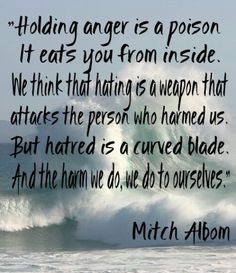
By: Melanie Kulatilake
“[They] abused me, [They] struck me, [They] overpowered me, [They] robbed me.” Those who harbor such thoughts do not still their hatred.
“[They] abused me, [They] struck me, [They] overpowered me, [They] robbed me.” Those who do not harbor such thoughts still their hatred.
-Quote from the Buddha in the Dhamapada Chapter 1
The experience of abuse, being stricken, being overpowered, or robbed is an experience anyone can have at some point in their life. These experiences may seem like causes for hatred towards the one that has done you wrong but, Buddha argues that this will only make you feel unhappy in the end. As people, we hold onto angers from the pettiest things to the most life changing events. The quote above, within the context of Buddhist ideals, means that all hatred no matter how justified it may seem is damaging to ones sanity and happiness.
It is important to understand this quote from the perspective of a practicing Buddhist. In Buddhism there is no right or wrong way to live or act. The Buddha is understood only as a human being and therefore recognizes that he has no right to tell us how to act or behave. The Buddha believes that you have to come up with realizations of life from your own experiences. That is why the Buddha simply states and does not demand that you “still your hatred.” It is important that you recognize yourself the damages hatred causes.
Hatred: the strong resentment you hold for another. We seek to justify our hatred. However, the Buddha would argue that there is no justified hatred. Hatred can be caused by many things, form the smallest acts to the most extreme offensive. WE can all imagine the smallest things that cause distain towards another. In such extreme offenses like physical abuse, molestation, robbery, verbal insult, and mental destruction, hatred may seem justified. Some might argue that a person who faces such dire abuse is justified in their hatred because they have been extremely wronged. Yet, Buddhist would still argue that hatred is never warranted. The one who hates is the person who hurts the most in the end rather than the one being hated.
Harboring hatred is physically and psychologically damaging to oneself. Scientists have proven time and time again that holding onto anger generates toxic chemicals in your body. The renowned Doctor Davis Suzuki says in “‘The Sacred Balance’, ‘condensed molecules from breath exhaled from verbal expressions of anger, hatred, and jealousy, contain toxins. Accumulated over 1 hr, these toxins are enough to kill 80 guinea pigs!’”. Though hatred can be physically damaging it often feels right.
Focusing on the positives when someone is acting in a way that is inhuman is not an easy task and nor should it ever be considered one. Reaching the understanding that hatred is not healthy for you is difficult. A Tibetan Monk by the name of Palden Gyatso was imprisoned for 33 years by the Chinese. He faced unspeakable tortures by the guards who had no respect for him as a human being. In his memoir he reflects, “when I was being tortured by my guards, I had immense hatred against them because I was being hurt. But, as a religious person, after the event I could reflect on what had happened, and I could see that those who inflicted torture did so out of their own ignorance. As a religious person I have to sit back and ask myself, what is all this? Buddhist teachings say, don’t let your calm be disturbed and do not respond to anger with anger.’” He realized that more hatred would not solve his problem. The only way for him to attain peace was to observe his circumstances and find a solution. He chose to no let hatred control him.
Sometimes we may find it difficult to relate our actions to religious leaders like monk Gyatso because we may not practice our religion in such depth. The Buddha teaches that giving up hatred and finding inner peace should be a reality of being a human. Alice Sebold is a rape victim and she realized that in order for her to live a happy life she would have to let go of her hatred towards her attacker. Alice struggled to tell her attacker “I forgive you,”… I said what I had to. I would die by pieces to save myself from real death.” She realized she would slowly kill herself on the inside if she never let go of her anger.
How you react to a situation is what you have control over. You have the ability to still your hatred. Holding onto your anger only hurts you in the end. Buddha’s message is that you deserve a life where you can move on and find happiness by letting go of hate. Letting go of hatred, thereby, making room for the positive aspects of life will lead to inner peace.
What Being an Interfaith Scholar means to Me
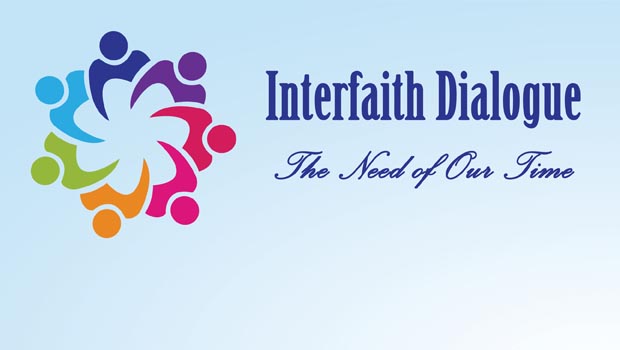
By: Shourouk Abdalla
In a world as chaotic as today where people shun others because of their differences, interfaith dialogue is necessary. Focusing on what makes us different creates a lack of communication thus more space for large and negative assumptions about each other. Being from the Middle East, I sure do know a thing or two about religious divide, however, I believe that is out of ignorance of each others faith and people dehumanizing each other. Everybody, and I mean everyone, has engaged in interfaith dialogue here at DePaul. It happens all the time, as humans we are in a constant flow of interactions and citizens of today are much more connected to each other than people centuries ago. So just because you did not know that one guy you talked to in your Bio lab the other day was a Muslim or Buddhist doesn’t mean you’ve never met a Muslim or Buddhist before.
As an Egyptian, I put a strong importance on people of different faiths coming together. Muslim Egyptians take pride in their Christian brothers and sisters as Christian Egyptians do the very same. This is one of my favorite aspects of Egypt and humanity as a whole because seeing people of different faiths hold hands and protect each other, especially in areas of conflict, is one of the most beautiful sights to see and experiences to be apart of.
Being an Interfaith scholar to me means I get to openly represent and uphold my Islamic faith in an acceptive environment while learning about and experiencing other faiths. Even though Chicago is a global city filled with worldly citizens who are open to differences because they are used to it, this is not the case all over America. My faith specifically, is constantly hated on by the media and actively attacked in the streets on a regular basis here in America. I’m here to show what an average day college Muslim girl looks like. It is more than important to have interfaith dialogue, as humans we should be obligated to because that simple understanding of each other and acceptance would make the world a much better place than where we’re at today.
What We Do: Interfaith scholars create a space for weekly interfaith dialogue where we openly discuss our faiths, share prayers, explain traditions, and talk about our own personal experiences. Besides hosting large-scale inter-religious campus events we are also open to attending and facilitating any group if a Professor needs a student to talk about a certain topic to their class or if students have their own personal questions.
The Ecological Spirituality of Elizabeth Ann Seton
We are living in an unprecedented age when ecological concern is rising as the most critical issue for humanity. It is not a lack of scientific knowledge that makes environmental problems so difficult to solve, but rather human arrogance. There are ecologists, however, who draw upon religious traditions to establish models for a healthy and harmonious relationship between nature and humanity. Sr. Sung-Hae Kim interprets the writings of Elizabeth Ann Seton from the perspectives of four contemporary ecological philosophers: Arne Naess, Anthony Western, Murray Bookchin, and Aldo Leopold. Sr. Kim presented the four characteristics that emerge as constitutive elements in Seton’s own ecological spirituality, and which marry contemporary ecological philosophy to Elizabeth Seton’s world-view. Lecture was recorded at Richardson Library at DePaul University on April, 27, 2016.
Vincentian Pragmatism: Toward a Method for Systemic Change
Scott Kelley creates the term Vincentian Pragmatism and defines it as “Vincent [de Paul]’s way of proceeding . . . [it is] an integrated and holistic way of knowing that is capable of systemic change.” He writes, “Vincentian Pragmatism must also inform the way we engage, identify, explore, interpret, and decide in response to the complex systems that exacerbate poverty. It must unite action and contemplation.” Kelley identifies questions we must ask to pursue Vincentian epistemology and explains how Vincent developed it from his own experience. The process of overcoming our biases and forming a Vincentian worldview is also examined. Vincentian Pragmatism has five components of action: “begin attentively, explore openly, interpret imaginatively, decide responsibly, and act courageously.” These are discussed in detail. Together, they are a way of truly understanding the causes and nature of poverty and strategizing for effective solutions. Different aspects of strategy are described.
“Vincentian Pragmatism: Toward a Method for Systemic Change” is an article by Scott Kelley, Ph.D., published in 2012 in the Vincentian Heritage Journal, Volume 31, Issue 2, Article 2, pp. 41-63, and it is available at: https://via.library.depaul.edu/vhj/vol31/iss2/2
